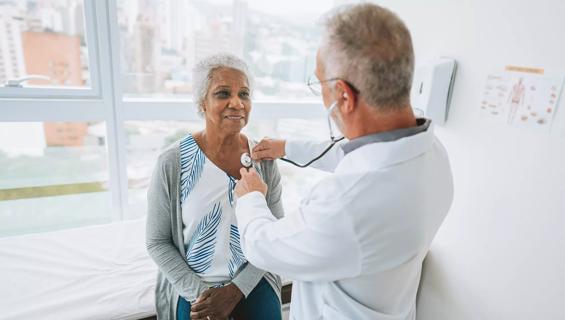Advertisement
What a female cardiologist wants you to know

It’s high time for women to have a heart-to-heart about heart disease.
Advertisement
Cleveland Clinic is a non-profit academic medical center. Advertising on our site helps support our mission. We do not endorse non-Cleveland Clinic products or services. Policy
For decades, most everyone thought it was something that primarily happened to men. We now know that’s not true — heart disease is the leading cause of death for women in the U.S.
But how much do you really know about heart disease? And how can you protect yourself?
We talked with cardiologist Leslie Cho, MD, Director of the Women’s Cardiovascular Center, about what women need to know — and what actions they can take to improve their heart health.
A: The No. 1 thing I want women to know is that heart disease is preventable.
Even if you have a terrible family history of heart disease, it’s preventable. We prevent it with eating right and exercise, not smoking and watching your alcohol intake.
A lot of people can completely prevent heart disease just by living well. And if they can’t, there’s medication that can help. We’re lucky to live in an era where medicine can lower your risk.
But the thing is, we don’t know what your risk is if you don’t get it checked. So that’s the most important step in preventing heart disease: seeing your doctor.
A: Originally, research wasn’t done on women. The mortality rate for women with heart disease wasn’t going down like men’s was, and people started to ask why.
One of the main reasons was that not only physicians ― but also patients ― had a lack of awareness about how heart disease affects women.
That’s why the American Heart Association started the Go Red for Women campaign. It’s been very successful in spreading the message to both physicians as well as women.
A: For most of their lives, women fixate on breast and gynecological cancer. But heart disease is actually a much bigger risk.
It’s only during menopause that most women start thinking about heart health — but that’s not when heart disease begins.
Women need to be proactive about their heart health starting in their 20s. You should get your cholesterol checked at age 20 and then every five years, or annually if you have other risk factors.
Monitor your blood pressure. Make sure your weight is in a healthy range. Follow a heart healthy diet and get plenty of exercise.
A: Actually, 70% of women have the exact same symptoms as men. There are a lot of misconceptions that women always have different symptoms, and that’s not true.
Advertisement
In fact, 30% of women have more atypical symptoms, like fatigue, shortness of breath without chest pain, or nausea. But the majority of women have the same symptoms as men.
A: Heart attack is initially diagnosed based on symptoms, but the confirming test is an electrocardiogram, or EKG. When women go to the emergency room, they still, on average, get an EKG a little more slowly than men.
But the bigger problem is that women tend to present at the ER with their heart attacks later than men do.
Sometimes they delay seeking treatment and getting a diagnosis because of the atypical symptoms. They may attribute the symptoms to something else, like heartburn or anxiety, and not realize they need treatment.
If you’re unsure about your symptoms, call 911. It’s better to let a medical professional decide for you.
Clearing up misconceptions about women and heart health can do a heart good. And don’t hesitate to have a heart-to-heart with your doctor if you think you’re at risk.
Advertisement
Learn more about our editorial process.
Advertisement

Factors like temperature, energy levels and sleep quality play a role in determining whether working out in the morning or evening is best for you

You may be more prone to hot flashes if you have anxiety, but hot flashes can also rev up anxiety

Obesity, age and preexisting heart conditions can all raise your risk of cardiovascular disease during pregnancy

Xylitol in processed food can increase risk of heart attack and stroke — but there’s no danger in xylitol in oral care products

If your provider has ruled out a serious cause, you can treat chest pain at home with antacids, inhalers or anti-inflammatory medications

Walking is a great goal, but how many steps are best for you depends on factors like your fitness level and age

Research shows a strong association between rheumatoid arthritis and heart issues

The scenarios vary based on how many pills you’ve missed and whether you take a combination pill or progestin-only pill

Focus on your body’s metabolic set point by eating healthy foods, making exercise a part of your routine and reducing stress

PFAS chemicals may make life easier — but they aren’t always so easy on the human body

While there’s little risk in trying this hair care treatment, there isn’t much science to back up the claims